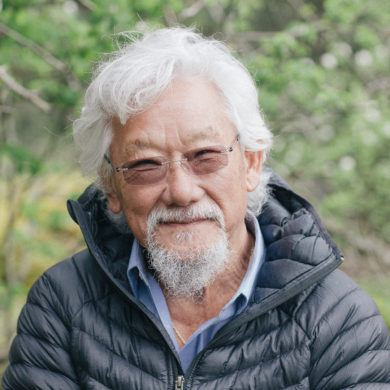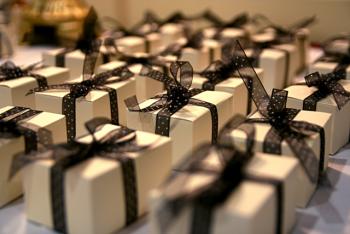
Date: 2024-12-21 Page is: DBtxt003.php txt00012424
Sustainability
BY DAVID SUZUKI
Tread lightly to lift the weight of the world
BY DAVID SUZUKI
Tread lightly to lift the weight of the world
DAVID SUZUKI

David Suzuki's picture
Dr. David Suzuki is a scientist, broadcaster, author, and co-founder of the David Suzuki Foundation. He is Companion to the Order of Canada and a recipient of UNESCO's Kalinga Prize for science, the United Nations Environment Program medal, the 2009 Right Livelihood Award, and Global 500. Dr. Suzuki is Professor Emeritus at the University of British Columbia in Vancouver and holds 26 honorary degrees from universities around the world. He is familiar to television audiences as host of the long-running CBC television program The Nature of Things, and to radio audiences as the original host of CBC Radio's Quirks and Quarks, as well as the acclaimed series It's a Matter of Survival and From Naked Ape to Superspecies. His written work includes more than 52 books, 19 of them for children. Dr. Suzuki lives with his wife, Dr. Tara Cullis, and family in Vancouver, B.C.

David Suzuki's picture
Dr. David Suzuki is a scientist, broadcaster, author, and co-founder of the David Suzuki Foundation. He is Companion to the Order of Canada and a recipient of UNESCO's Kalinga Prize for science, the United Nations Environment Program medal, the 2009 Right Livelihood Award, and Global 500. Dr. Suzuki is Professor Emeritus at the University of British Columbia in Vancouver and holds 26 honorary degrees from universities around the world. He is familiar to television audiences as host of the long-running CBC television program The Nature of Things, and to radio audiences as the original host of CBC Radio's Quirks and Quarks, as well as the acclaimed series It's a Matter of Survival and From Naked Ape to Superspecies. His written work includes more than 52 books, 19 of them for children. Dr. Suzuki lives with his wife, Dr. Tara Cullis, and family in Vancouver, B.C.
Original article: http://rabble.ca/blogs/bloggers/david-suzuki/2016/12/tread-lightly-to-lift-weight-world
www.davidsuzuki.org.
Peter Burgess COMMENTARY ... added in April 2024
I archived this article from Dr. David Susuki almost a decade ago. While there are a good many people who are promoting the idea of 'sustainability', I worry that they are losing ground to the people who are interested in one thing only and that is their own personal wealth and power.
I am writing this note at the ripe old age of 84. I am of reasonably sound mind ... but increasingly bothered by the state of society in a large part of the world, including a large part of the United States.
As I see it, the potential of the modern world is fantastic because modern technology is so powerful. Unfortunately, the sad fact is that powerul modern technology can be used just as easily for 'bad' as it can be for 'good'. For all practical purposes the governenance framework of law and regulation that we used to have to ensure that 'good' is allowed and 'bad' is stopped cannot handle the pace of modern change.
There has always been confrontation between the forces for good and the forces for bad ... and we have survived.
Whether we will survive the next confrontation is not by any means 'for sure!' In fact, I am fairly sure that the next confrontation could mean the end of humanity as we know it.
What is so infuriating is that the potential of modern technology to enable a world that is better than anything we have ever had in all of history is being squandered because of the dumbness and pettiness of a lot of the people with power and influence.
What to do?
Peter Burgess

Photo: Steven Depolo/flickr
Tread lightly to lift the weight of the world
How much stuff will you give and receive this holiday season? Add it to the growing pile -- the 30-trillion-tonne pile. That's how much technology and goods humans have produced, according to a study by an international team led by England's University of Leicester. It adds up to more than all living matter on the planet, estimated at around four trillion tonnes.
Scientists have dubbed these times the 'Anthropocene,' because humans are now the dominant factor influencing Earth's natural systems, from climate to the carbon and hydrologic cycles. Now they're labelling our accumulated goods and technologies -- including houses, factories, cars, roads, smartphones, computers and landfills -- the 'technosphere' because it's as large and significant as the biosphere, atmosphere and hydrosphere. Researchers estimate it represents 50 kilograms for every square metre of Earth's surface and is 100,000 times greater than the human biomass it supports.
As CBC science commentator Bob McDonald wrote, 'Our technology is a super-organism that competes with the biosphere for resources, and is winning that competition by taking over the surface of the planet.'
Report co-author Mark Williams explained the significance: 'The technosphere can be said to have budded off the biosphere and arguably is now at least partly parasitic on it. At its current scale the technosphere is a major new phenomenon of this planet -- and one that is evolving extraordinarily rapidly. Compared with the biosphere, though, it is remarkably poor at recycling its own materials, as our burgeoning landfill sites show. This might be a barrier to its further success -- or halt it altogether.'
Living systems renew and recycle. Organisms die, get eaten or absorbed by other organisms, and other life takes their place. But much of what we produce takes enormous amounts of natural, mostly finite resources to make and breaks down slowly, if at all. It covers the land and fills oceans, and even extends into space. As the human population continues to grow and consumerism shows no signs of abating, the technosphere expands, causing pollution, contamination and resource depletion, further upsetting the delicate natural balance that keeps our planet habitable for humans and other life forms.
Many things we've invented have made our lives easier in some ways. But much is unnecessary and, we've learned, a lot comes with consequences we didn't foresee -- such as climate-altering greenhouse gas emissions from our obsession with private automobiles and cheap energy.
If this pace continues, we'll leave a fascinating fossil record for any intelligent species that comes across our planet in the future. But that may be all. If we want to survive as a species, we must get a handle on population growth and consumerism. It's something to consider this time of year, when so much time and energy are spent on acquiring new stuff, for ourselves and others.
Although population growth is starting to stabilize, curtailing growth requires greater access to effective, voluntary family planning and birth control, increased women's rights including the right to make decisions about their bodies and reproduction, and reducing poverty.
We can all do our part to reduce consumption. We might find we're happier when we do. At the end of his life, my father didn't talk about accomplishments or possessions or wealth. He talked about connections to friends and family and shared experiences. Although he didn't have a lot of material possessions, he felt wealthy and happy.
That's what life is about. A new car or smartphone won't make you happier in the long run. Nor will it fill gaps caused by loneliness or lack of connection to others. That doesn't mean we should live without material goods, but we should consider what we really need, and make sure we recycle items we can no longer use. Reduce, re-use and recycle! And reconsider what really makes us happy. More important, during the holiday season, we should nurture our connections to friends and family, and give gifts that won't add to the technosphere. We can share time, experiences and food. Those who find themselves alone might consider volunteering to help others during what can be a difficult time.
May you all have a joyous season, focused on the important things in life. And may the New Year bring humanity a greater understanding of what truly makes life worthwhile.
Written with contributions from David Suzuki Foundation Senior Editor Ian Hanington.
rabble blogs are the personal pages of some of Canada's most insightful progressive activists and commentators. All opinions belong to the writer; however, writers are expected to adhere to our guidelines. We welcome new bloggers -- contact us for details.